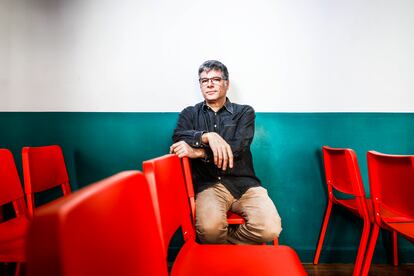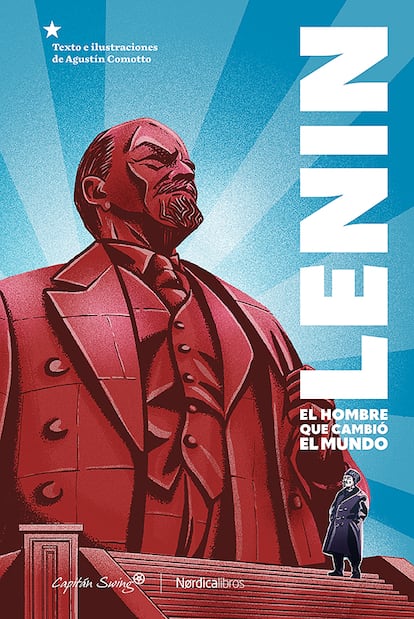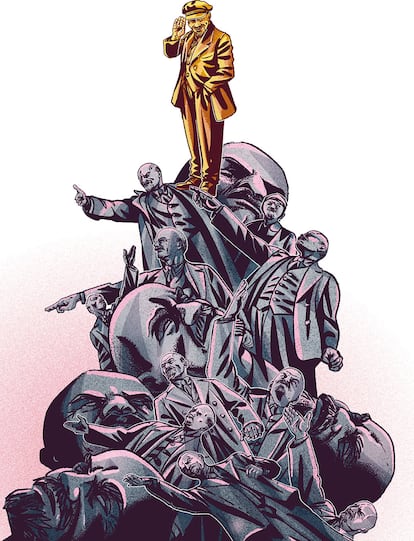The history of Russia in the 19th and 20th centuries is one of the hobbies of Agustín Comotto (Buenos Aires, 56 years old). This passion of the Argentine illustrator – based in Barcelona and author of, among others, Stein o 155. Simon Radowitzky― was known at the Nórdica publishing house, with which she usually works. This is how the carefully crafted graphic novel was created Lenin, the man who changed the worldco-edited with Capitán Swing and published a few months ago, in the midst of the centenary of the death of the architect of the Soviet Union. “They asked me for a publication that would interest those who do not know the character, but also those who know him better,” he explains from the Traficantes de Sueños bookstore, during a visit to Madrid.
“My father was a Marxist-Leninist, a militant. I am not,” he explains. “The Russian Revolution was a manifestation, a vomiting of the people, which was later transformed into what became the USSR. That original revolution was not Bolshevik, many anarchist movements participated. I feel much more akin to this current.”
Ask. What have you discovered about Vladimir Ilyich Ulyanov?
Answer. He was a non-smoker, a deeply neurotic man, clever and possessed an impressive intellectual capacity. To give an opinion on Lenin, I think you would have to understand Russian, since almost all the references we have about him are biased: they are either from Western historians or from Soviet translations. After his death, Stalin exerted pressure to create the myth. Fortunately, archives have been opened in Russia, in which there is a lot of Lenin’s correspondence. In these letters we find a very different figure to the one constructed after his death.
P. Was it difficult to adapt?
R. Lenin’s epic lasted 53 years, and he spent about 17 in exile. He died of a cerebral thrombosis, just like his father. Although he is a character that fascinates me and I have researched, it has been a hard task to summarize. His production was enormous for such a short life. He slept very little and had two drugs: work – he spent days of more than 10 hours reading and writing – and power.
P. You claim that your path was to rise to power.
R. Lenin knew that power could be acquired, but that the hard part was maintaining it. He had no particular talent – he was not a magnetic person, nor a great writer or speaker – but he knew how to read the masses. Something that today is worth its weight in gold. On a political level, there was one moment in his life that was masterful: the taking of the October Palace.
P. Because?
R. He wants power, it is not guaranteed and he is against the clock. The real blow comes at the Soviet Congress, when the wealth of the Soviets becomes a Bolshevik triumph; a radical space that had been a historical minority. Lenin takes control and begins to diagram the Soviet State, with some fascinating characteristics. For example, the idea that the future is there ahead, and that one must always move in that direction. There is a kind of secular religion in all this.
P. Is there any ambition for the future at the moment?
R. The current aspiration is based on maximizing individualism; optimism is associated with the possibility of having a little more salary to be able to change jobs. smartphoneWe live in an ultra-capitalist society, in which no one considers a life in a collective. We are unconscious. Lenin’s proposal is the opposite.
P. Do you think a new social class is emerging?
R. Rather, a new paradigm is emerging: What do we do? In capitalism, we had to work and produce. However, humanity now faces two major challenges. On the one hand, collapse: we are cruising at an unstoppable speed against a wall that is the Earth and its limited resources. On the other, technology. And I refer to the speech (by the anarchist intellectual Piotr) Kropotkin, when he spoke of the moment when humanity would develop a technology that would lead us to rethink the meaning of work.

P. Meanwhile, social media is rethinking the meaning of truth.
R. They are an artifact. They were supposed to bring people together, and it turns out that they have never been more alone. Do people think that followers are friends? Different realities are created on social networks, everyone is in their own bubble. When the sense of reality is lost, social control becomes easier. That is why the far right is at full throttle on TikTok. They have realized that by putting into practice a series of maneuvers they win elections: they started with Bolsonaro and continued with Argentina. There are professionals who work to brainwash people and manipulate them.
P. What network would Lenin be on?
R. On TikTok. And it would go very well. He would use all the technological means at his disposal. That is what he did at the time with photography or cinema. In addition to starting his own media; with October o The Battleship Potemkin stories were created. On the other hand, he used any methodology to knock down his opponent, even breaking the codes. When he called an opponent a vermin or a stinking rat, he did not do it to insult them, but to get them out of the box. This methodology is similar to the one used by Trump, who is a master at this. And one more: contemporary politics also works with spin doctors: Iván Redondo, Miguel Ángel Rodríguez, or Steve Bannon. Lenin is the predecessor of many of these strategies.
P. ¿Why does Lenin continue to generate this viscerality?
R. The first person to start the narrative of hatred towards Lenin is Churchill. He told the Germans: ‘You have created the machine that will destroy you completely’. He did this during World War I, when Germany was funding Tsarist dissidents, to try to make the empire collapse and to get control of that front. So they gave a lot of money to the Bolshevik cause, because they were the most radical. Churchill warns them that if these people come to power, they will call capitalism into question, not the Germans or the English, but the whole world. He is the first to create this kind of monster that can destroy everything that good men believe in. Basically, the Cold War is based on this discourse. And it continues: today, there are people and politicians who describe everything that is against them as communism, Leninism, Stalinism, anti-Semitism…


